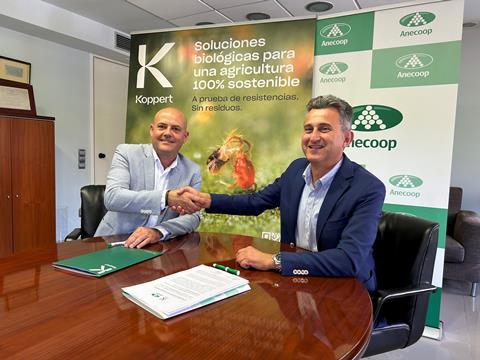Under the new deal Koppert will train cooperatives on biological pest control techniques

Anecoop has teamed up with Koppert to promote the use of integrated pest control measures among its member cooperatives. The two entities met this week at Anecoop’s headquarters in Valencia to sign a collaboration agreement whereby Koppert will train cooperatives on biological pest control techniques, one of the main tools in integrated crop management.
Anecoop said it hopes to lead a paradigm shift in the management of plant health in the fruit and vegetable, enabling producers to face the challenges posed by climate change, the demands of consumers and the increasingly restrictive community regulations on pesticide use under the European Union’s Farm to Fork strategy.
Anecoop will launch a number of field trials on its farms to study the feasibility of replacing certain chemical pesticides with new biological solutions.
The first trials will focus on fighting the long-tailed mealybug (Pseudococcus longispinus) in persimmon and the effectiveness of biological control against the main citrus pests.
The joint development of a biological control strategy in the open air and greenhouse cultivation of watermelon is also planned, adapted to the needs of the different production areas in which Anecoop’s cooperatives operate.
The deal will also serve to reinforce training and knowledge transfer in the field of biological control of pests and diseases. Both Anecoop’s technical field advisors and the producer members of the cooperative group will receive specific training that will be supervised by Koppert.
“We know that carrying out biological pest control in agriculture has nothing to do with the conventional methodology of chemical treatments and that optimal results are achieved with adequate training and advice,” said Koppert’s commercial director, Juan Miguel Rodríguez.
Ángel del Pino, director of Anecoop’s production and development department, commented: “The implementation of biological pest control will allow us to reinforce our commercial prestige, both towards wholesale buyers and towards end consumers.
“Said reinforcement will be possible thanks to a series of positive values that are closely associated with biological control, such as sustainability, compatibility with market requirements, the search for zero waste solutions to emerging pests and the promotion of biodiversity in the production areas.”



